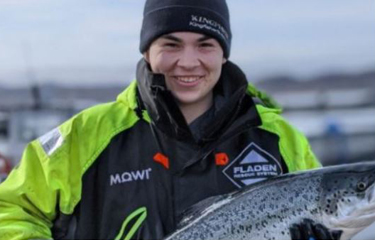Mowi Scotland has addressed the latest allegations made by anti-salmon farming campaign groups that claim the producer’s salmon and cleaner fish are subject to welfare abuse.
Undercover video and photo footage posted on Scottish Salmon Watch’s website and social media sites claim to show dead farmed salmon and cleaner fish floating on the surface of cages, as well as lice-infested salmon swimming in a shoal of wild fish inside a cage. The activist group alleged that the footage came from Mowi farms certified by welfare standards body RSPCA Assured.
In a press release, Scottish Salmon Watch Director Don Staniford called for a full shutdown of Mowi’s operations in Scotland.
“The Scottish government should immediately close down Mowi’s disease-ridden farms and supermarkets should stop selling RSPCA Assured Scottish salmon,” Staniford said. “The RSPCA’s stamp of approval is now synonymous with welfare abuse. Shame on RSPCA Assured for endorsing lice- infestation, mass mortalities, infectious diseases, and unnecessary suffering.”
Having been shown the content, U.K. retailer Co-op on Monday 19 July said through its Twitter account that it would suspend supplies of salmon pending an investigation into the violations. However, its Twitter posts were later removed, and the retailer then announced there would be no suspension.
Mowi Scotland also issued a response to the allegations, saying they “lack veracity” when compared to farming data released by its own processing operations within days of the filming. It said one of the farms targeted by Staniford had sent fish to market on the same day he filed an animal welfare complaint to the RSPCA and the Animal and Plant Health Agency (APHA). A total of 8,940 salmon weighing an average 5.71 kg were harvested from Mowi’s BDNC salmon farm. The quality of these salmon from the farm yielded excellent results – over 98.8 percent graded by experts for scale quality and general condition as top “superior” grade, it said.
As part of a regular fish welfare inspection, veterinarian Jaime Santana attended the processing of BDNC salmon on 19 July at Mowi’s Blar Mhor processing plant in Fort William and endorsed the quality of the fish.
“The salmon are in really great condition with acceptable parasite load, good integrity of the skin, and are receiving a high rate of salmon being categorized as superior,” Santana said.
Mowi’s statement confirmed that Staniford had indeed entered some of its salmon pens on 16 and 17 July with an underwater camera with the goal of recording images of individual fish showing signs of distress. Mowi said similar allegations that were filed in March this year, triggered an investigation by the Royal Society for the Prevention of Cruelty to Animals (RSCPA).
After a physical inspection by RSPCA Assured auditors and consideration of the complaint received, the third-party animal welfare organization found no evidence to support the claims made by activists, it said.
“The way this is presented is very unfair and lacks credibility. We care for the welfare of our salmon, every day, and don’t like to see even one animal suffer. Our experienced farmers are supported by fish health experts and veterinarians that help to ensure animal welfare is attended to every day, and these results are inspected by professional third-party organizations.” Mowi Scotland COO Ben Hadfield said. “While we take claims of poor welfare very seriously, this allegation is from an individual who has never worked in the business, has previously made similar unsupported claims, has been found guilty of defamation, and was described by the court judge as ‘akin to a zealot.’ Salmon harvested from these farms showed 98.8 percent superior grade [and were] great-looking fish in good physical condition.”
Mowi conceded that the vast amount of swimming area afforded to salmon in net pens – typically more than 25,000 cubic meters of space – does present difficulty in immediately tracking and tending to individuals that may flee when approached, but that it is investing in technology that will help address this issue.
Its new “Smart Farming 4.0” technology includes underwater sensors that will automate animal welfare tracking, alerting experts in real time should extra care and attention be required.
“As with all types of farming, there will unfortunately be times when individual animals are in distress, and these isolated examples can be understandably concerning to the public as well as the farmer,” Hadfield said. “Farmers and veterinarians will do whatever they can to treat animals under their care, or, when circumstances require it, may have to choose to humanely euthanize the animal.”
Mowi said that it will continue to share information with third-party animal welfare organizations and welcomes auditors to its farms for planned and unplanned visits. It will also continue to deploy teams of staff to farms that, during warm summers when increasing water temperatures challenge fish health, will focus on treating or humanely removing individual fish that show signs of distress.
Photo courtesy of Mowi







